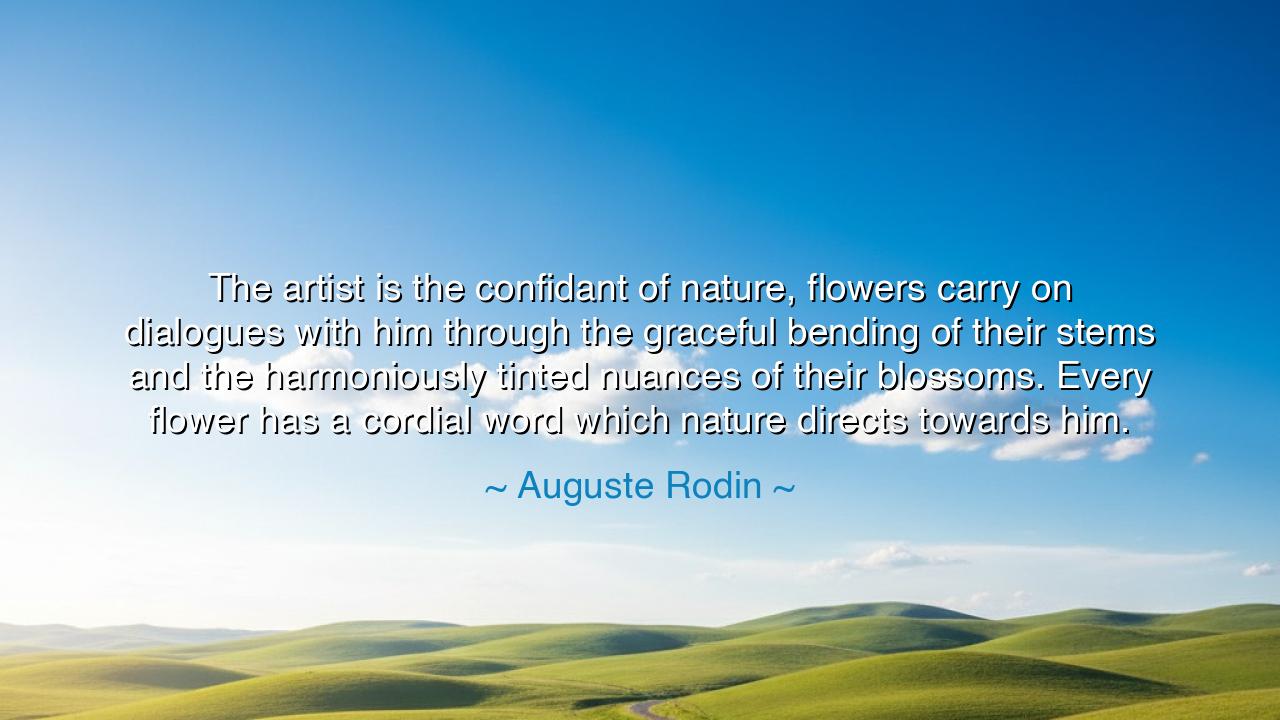
The artist is the confidant of nature, flowers carry on
The artist is the confidant of nature, flowers carry on dialogues with him through the graceful bending of their stems and the harmoniously tinted nuances of their blossoms. Every flower has a cordial word which nature directs towards him.






In the words of Auguste Rodin, master of form and fire, “The artist is the confidant of nature, flowers carry on dialogues with him through the graceful bending of their stems and the harmoniously tinted nuances of their blossoms. Every flower has a cordial word which nature directs towards him.” Here, Rodin speaks not only of the sculptor, the painter, or the poet, but of that eternal soul who dares to listen to the secret speech of the world. He teaches us that creation is not the invention of man alone, but a sacred dialogue between the human spirit and the earth that bore it.
To call the artist the “confidant of nature” is to declare that the true creator is no tyrant, forcing shape upon chaos, but a listener, a friend, a keeper of mysteries whispered in silence. Just as a confidant is entrusted with secrets, so too the artist receives the tender revelations of the world: the curve of a leaf, the shimmer of a stream, the blush of dawn. These are not accidents; they are words in a language older than man, and the artist, with open eyes and a patient heart, becomes its interpreter.
Consider the flowers Rodin names—those fragile emissaries of beauty. To the common passerby, a flower is but ornament, fleeting and simple. Yet to the artist, it is a messenger, bending gracefully, shading its petals in hues that speak of longing, joy, and the eternal pulse of life. The bending of the stem is not mere movement—it is a bow, a gesture of humility, an unspoken phrase that only the attentive can understand. In this way, the artist does not merely see—he hears the unvoiced speech of existence.
History shows us many who embodied this truth. Think of Vincent van Gogh, who saw in the sunflowers not only yellow petals but flames of devotion, sorrow, and hope. Where others saw mere flowers in a vase, Van Gogh heard the whispering dialogue of nature, and with his brush, he translated it into a cry that still moves the human soul across centuries. He was mocked, he was misunderstood, but he was confidant to something deeper, something eternal—and this is why his work speaks louder now than it ever did in his lifetime.
Rodin himself lived this mystery. His sculptures were not stone made into shape by brute force; they were conversations with marble, with bronze, with clay. He would say that the form already dwelled within the block, and his task was to uncover it. This humility before nature’s design—this willingness to listen, rather than impose—is the hallmark of the true artist. It is the same humility that Michelangelo echoed when he declared that his statues were already sleeping within the marble, waiting only to be freed.
Thus, Rodin’s teaching is more than a meditation on beauty; it is a guide to living. For whether one paints or writes or sculpts—or even if one never calls oneself an artist—each soul is capable of listening to the cordial word of nature. To sit in silence beneath a tree, to watch the turning of seasons, to behold the fragile bloom of a flower—this is to enter into dialogue with the eternal. But the eyes must be trained, not on screens or noise, but on stillness. Only then can one become a confidant of the world.
Let us then draw a lesson for our days: slow down, observe, and listen. Carry with you the reverence of the artist, for every field, every blossom, every stone is speaking if you will but hear. In practice, this means setting aside moments to walk among trees, to gaze upon flowers, to sketch or write or simply reflect. It means treating the world not as an object to be used, but as a friend to be heard.
Thus, the teaching of Rodin resounds: the artist is the one who dares to listen. If we live as artists of the spirit, confidants of the world, then life itself becomes a masterpiece, not shaped by force, but born of communion with the infinite voice of nature. And in that communion, we find not only beauty, but the wisdom and peace for which all hearts long.






AAdministratorAdministrator
Welcome, honored guests. Please leave a comment, we will respond soon